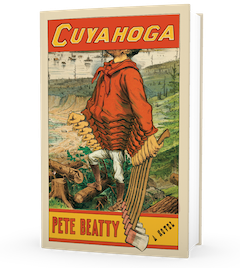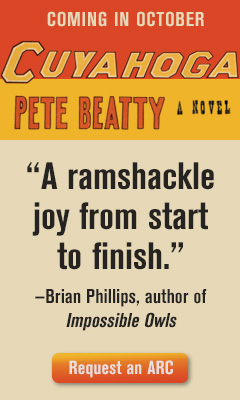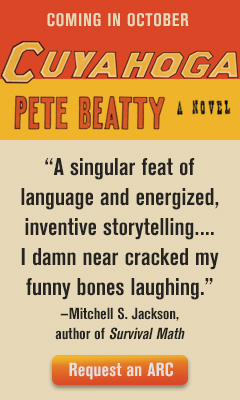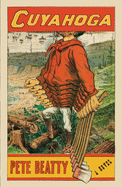Cuyahoga
by Pete Beatty
Pete Beatty's Cuyahoga is a wild romp, a colorful tall tale and a tender-hearted revisionist history. In the early days of Ohio City and Cleveland, the two cities at the mouth of the Cuyahoga River struggle for primacy, peopled by larger-than-life heroes and classical fools.
The year is 1837, and the narrator of this farfetched story is Meed (short for Medium Son). He promises "wholesome tales, without too many fricasseed widows. True mostly--I will not lie any more than is wanted for decency." His own protagonist is his brother, Big Son, part superhero and part town mascot, a "foremost spirit of the times," with "shoulders wide as ox yokes... waist trim as a sleek lake schooner." In the opening pages, Big must subdue a forest before Ohio City can be founded. "I imagine you are accustomed to meek and mild trees that do not want correcting," Meed tells readers in a confidential tone, but "you do not know the manners of our trees." Big's feats are the stuff of legend, and the crafting of that legend is Meed's work:
"Stories will go to rot without puttingup. You must salt them into Egyptian mummies, or drown them in lying sugar. Bury them in winter and freeze their blood.
But you would hide the honest stink, the moschito bites, the wounds, the living glory.
Let you and me do without salt and sugar. Taste matters true--even if the truth is half rotten."
Cuyahoga often appears to be Big's story, but like many of the best narrators, Meed must eventually step forward and reveal himself. Along the way he will profile the conjoined cities and a number of their livelier inhabitants. The fate of the brothers is inextricable from the drama of the towns' rivalry.
Big's problem, which launches this picaresque tale, is that his fabled feats inspire the admiration of the townspeople, but rarely pay in currency. He wishes to marry the beautiful, strong, quick-witted and thoroughly independent Cloe Inches, "somewhat-sister" to Meed and Big (all three are adopted). Readers understand early on that Cloe does not wish to marry at all, but the protest she makes over Big's lack of funds is the message he hears most clearly. Much of Cuyahoga tracks his attempts to earn a living that will let him "make an honest man of myself," as Big puts it, and win her hand.
Big's attempts to better himself merge with Ohio City's bid for greatness. The towns' rivalry comes to a head with the question of a bridge across the Cuyahoga: Who will pay for it? Where will it be located (and therefore who will get the business of the tradespeople who use it)? When a location is chosen that puts Cleveland at an advantage, a chant rises up in Ohio City: "Two bridges or none." This is the kernel of conflict that will put Big at odds with his town, unsettle Meed's established loyalties and threaten the peace of the Cuyahoga's twin cities.
Cuyahoga is seasoned liberally with other memorable characters: the prickly Cloe is joined by "Elijah Frewly, the worst rastler in Ohio, who wore black eyes regular as whiskers" and the grimly nurturing Mrs Tabitha, who "ambuscades" her children (adopted and natural) with corncakes each morning. (One of Meed's poetic traits is the coining of words: "To ABSQUATULATE were a general term for departing with haste.") Even among such a cast, grocer (read: barkeeper) August "Dog" Dogstadter stands out. Dog's bar brims with uncouth characters and bristles with weaponry: "Hoes, plows, rakes, scythes. Mattocks and sledges. Pokers and tongs. Mammoth laundry spoons and rusted cleavers. Implements for encouraging people. Pikes, clubs, a spear...." Dog himself embodies and leads this menagerie, not necessarily a force for good. After the first attack on the hated bridge, Dog and his motley crew are immediate suspects. Meed is always on hand to record the drama, including horse and boat races, midnight graveyard hauntings, threatening nocturnal pigs and the finer points of the frontier coffin-making business.
For all its vivid spirits and outsize feats, Cuyahoga's greatest achievement is Meed's unorthodox voice, unpolished but often piercingly wise, and peppered with surprising allusions. "FIVE DOLLARS SHERIFF'S FINE FOR ANY PIG TO WONDER IN THESE PREMISES," the graveyard sign reads; "I believe the sign maker meant WANDER and only spelled badly. But the mistake had a poem to it.") Meed is given to poetry in his own cockeyed way. Early morning events take place "before dawn put a rosy finger on Ohio," in reference to ancient Greek classics. His voice and perspective are by turns simple, philosophical, silly and serious. Readers are entirely on his side by the time the loveable, hapless Meed must eventually balance his devotion to his hero brother with his own desires, and ask: "If I were a spirit, how would I go?"
Zany Midwestern history, oddball superhero story, poignant tale of brotherhood and self-discovery: this is an utterly fresh debut novel. Cuyahoga is ever surprising. --Julia Kastner








